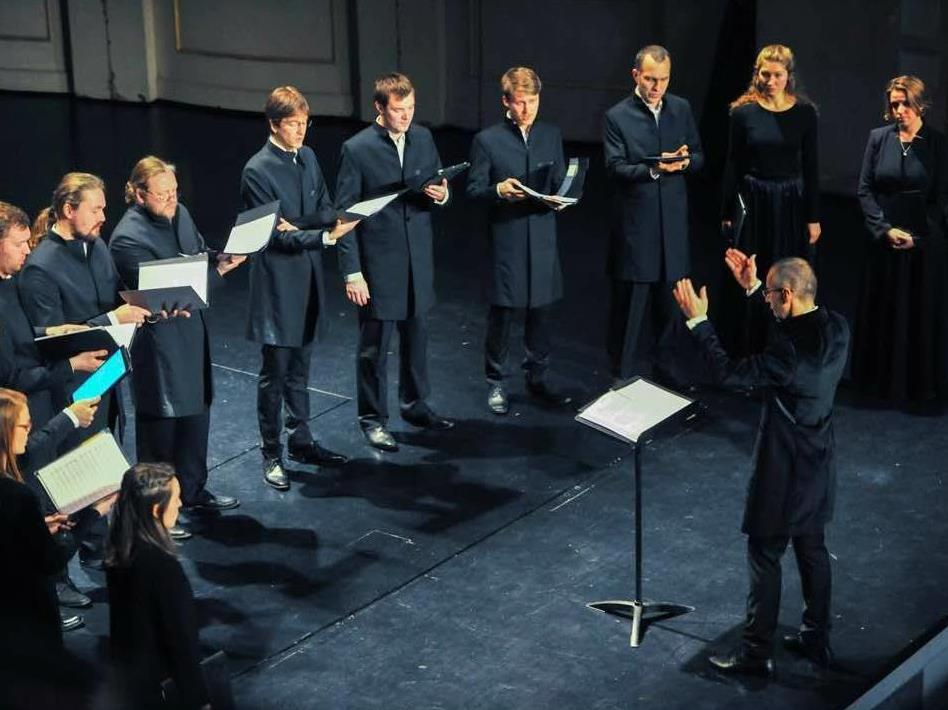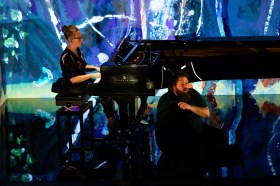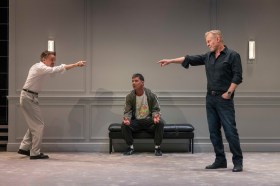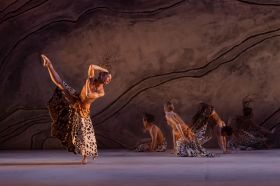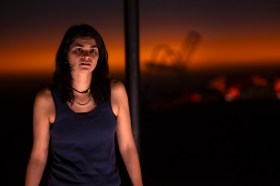On its way to perform in the Sydney Festival and luckily with a stopover in Melbourne, Vox Clamantis, the Estonian chamber vocal ensemble of 13 voices under the direction of its founding artistic director Jaan-Eik Tulve, performed in Elisabeth Murdoch Hall on Thursday night. This performance was a combination of chant (Tulve values it as “the foundation of Western Art”), some medieval and contemporary work, but the main focus, as the title of the program suggests, was on Estonia’s most famous composer, Arvo Pärt. He is 82 this year and the ensemble has had a longstanding association with him.
The unprecedented rise to fame of Arvo Pärt began in 1976 with a solo piano work called Für Alina. Having written in an uncompromising highly chromatic serialist style, he fled the Soviet Union in 1980 for Vienna with his Jewish second wife, a musicologist, whereupon he adopted the Russian Orthodox faith. The spare and still works that he was now writing, a style he referred to as ‘tintinnabuli’, initially drew little notice. His later works have been described as ‘sounding icons’ emerging from silence with serene economy of gesture and austerity of mood. Characteristics of medieval music can be found such as modality, counterpoint and proportional relationships. The music is largely non-narrative; rather, there is a strong overall reliance on symmetry. His outlook is inspired by Gregorian chant. Astonishingly, since 2010 Arvo Pärt has been one of the most performed living classical composers in the world.
It was therefore fitting that this cleverly formed program commenced with the ensemble of singers processing onto the stage of Elisabeth Murdoch Hall singing the plainchant Maundy Thursday antiphon Mandatum novum ‘I give you a new commandment, that you love one another. Just as I have loved you.’ (John 13:34). Dressed in black with the male singers in frock coats, the ensemble made a fine first impression. Chant threaded its way through the recital and Jaan-Eik Tulve’s speciality in this music was evident, with subtlety of rapport, resolved and well-shaped phrasing. It became apparent that granite-like basses, clear tenors and rich altos matched with shining sopranos together created the ensemble’s excellent sound, tuning and blend.
Pärt’s Drei Hirtenkinder aus Fátima (‘Three little shepherds of Fatima’) was written in 2014 and first performed by Jaan-Eik Tulve and his ensemble. Dedicated to the German contemporary painter Gerhard Richter, the work flowed effortlessly over its ostinato of ‘Alleluia’ in the lower parts. Pärt’s minimal, spare, sectional and still work The Deer’s Cry (2007) followed, setting part of the Lorica, a prayer for protection by Saint Patrick of Ireland.
We were then transported to the early 15th-century Burgundian School with Gilles Binchois’s carefully shaped setting of Amours mercy, in which falsetto voice was used within a reduced ensemble. The Notre Dame School of the 12th- and early 13th-century followed in Pérotin’s glorious Dorian setting of Beata viscera. It featured an astonishingly fine bass soloist unidentified in the printed program and was accompanied by drones through which the overtone series whistling above was expertly controlled. Two short settings by Estonian Cyrillus Kreek were performed, music that was entirely new to me. Mu süda, ärka üles (‘Awake my heart’) in praise of the Creator and David’s Psalm 121 setting verses 1-8 (‘I lift up my eyes to the hills’) were both sincere and gentle works. Tuneful and modest, they were maturely understood and conveyed by the ensemble.
The Morning Star, eternal symbol of hope and the return of Christ, is a recurrent inspiration for Pärt, most notably in his awe-inspiring O Morgenstern from the 7 Magnificat-Antiphonen for mixed choir (1988, 1991). Morning Star, a small work by comparison of just three minute’s duration, was commissioned by Durham University to celebrate its 175th anniversary in 2007. I Am the True Vine, one of the composer’s best-known works followed. Setting John 15:1-14, the work proceeds with sections being passed throughout the ensemble like the tracery of a great espaliered vine.
Helena Tulve’s Ole tervitatud, Maarja (‘Hail Mary full of grace’) a miniature for women’s voices alone was followed by a work composed by a bass in the ensemble. Ending this fine recital Tõnis Kaumann’s Ave Maria (2013) was a magical exploration of the Gregorian mode with a recurrent motif for inner voices adorned with a trio of spatially separated higher-voiced soloists singing in free time.
A highly appreciative audience welcomed two encores. First was Ma navu, a Jewish melody setting words from Isaiah 52:7 ‘How beautiful upon the mountains are the feet of the messenger who announces peace’, and finally a work by Arvo Pärt, his Kleine Litanei. An invocation of Saint Virgil, Bishop of Salzburg and one of the great theologians and thinkers of the early Middle Ages, this short work was composed for the reopening of the medieval Virgil Chapel on the Stephansplatz in Vienna in 2015.
Although there were texts and translations, it was odd that the audience was not provided with any introductory notes in the printed program for this unusual repertoire.
We hope that it will not be long before these stylish Estonians return to the Melbourne Recital Centre.
4 stars out of 5
Morning Star – the Music of Arvo Pärt
Vox Clamantis
Presented by the Melbourne Recital Centre
Elisabeth Murdoch Hall
Thursday 25 January, 2018

